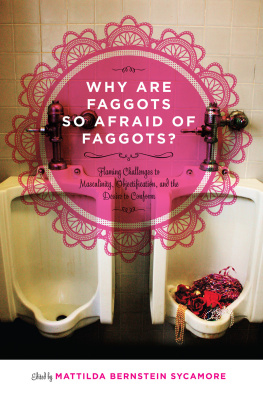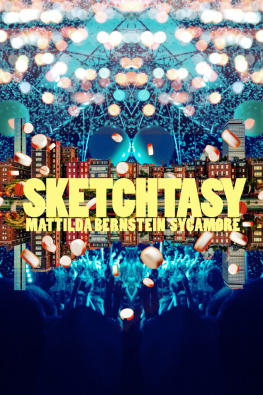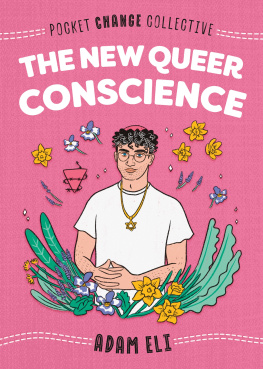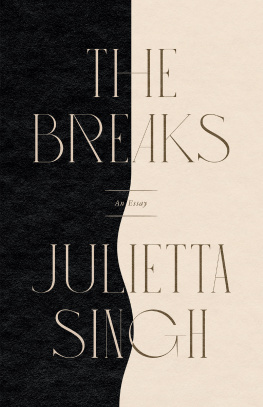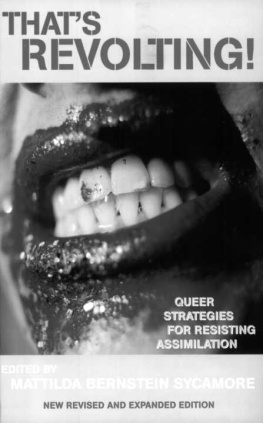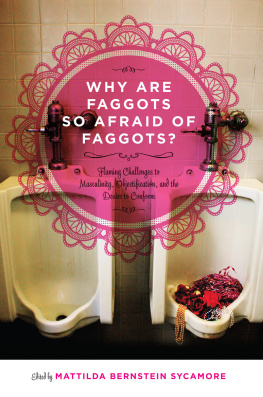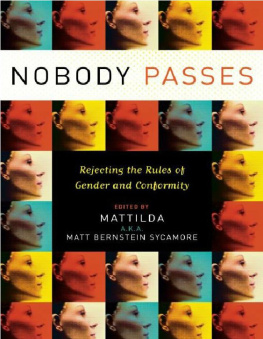Mattilda Bernstein Sycamore - The End of San Francisco
Here you can read online Mattilda Bernstein Sycamore - The End of San Francisco full text of the book (entire story) in english for free. Download pdf and epub, get meaning, cover and reviews about this ebook. year: 2013, publisher: City Lights Publishers, genre: Detective and thriller. Description of the work, (preface) as well as reviews are available. Best literature library LitArk.com created for fans of good reading and offers a wide selection of genres:
Romance novel
Science fiction
Adventure
Detective
Science
History
Home and family
Prose
Art
Politics
Computer
Non-fiction
Religion
Business
Children
Humor
Choose a favorite category and find really read worthwhile books. Enjoy immersion in the world of imagination, feel the emotions of the characters or learn something new for yourself, make an fascinating discovery.

- Book:The End of San Francisco
- Author:
- Publisher:City Lights Publishers
- Genre:
- Year:2013
- Rating:3 / 5
- Favourites:Add to favourites
- Your mark:
The End of San Francisco: summary, description and annotation
We offer to read an annotation, description, summary or preface (depends on what the author of the book "The End of San Francisco" wrote himself). If you haven't found the necessary information about the book — write in the comments, we will try to find it.
The End of San Francisco breaks apart the conventions of memoir to reveal the passions and perils of a life that refuses to conform to the rules of straight or gay normalcy. A budding queer activist escapes to San Francisco, in search of a world more politically charged, sexually saturated, and ethically consistentthis is the person who evolves into Mattilda Bernstein Sycamore, infamous radical queer troublemaker, organizer and agitator, community builder, and anti-assimilationist commentator. Here is the tender, provocative, and exuberant story of the formation of one of the contemporary queer movements most savvy and outrageous writers and spokespersons.
Using an unrestrained associative style to move kaleidoscopically between past, present, and future, Sycamore conjures the untidy push and pull of memory, exposing the tensions between idealism and critical engagement, trauma and self-actualization, inspiration and loss. Part memoir, part social history, and part elegy, The End of San Francisco explores and explodes the dream of a radical queer community and the mythical city that was supposed to nurture it.
Mattilda is a dazzling writer of uncommon truths, a challenging writer who refuses to conform to conventionality. Her agitation is an inspiration.Justin Torres, author of We the Animals
Author Mattilda Bernstein Sycamore is the artistic love child of John Genet and David Wojnarowicz, deconstructing language swathed in unbridled sensuality, while flinging readers into a disrupted, chaotic life of queer anarchy.Gay and Lesbian Review
Bring on The End of San Francisco! And Mattilda Bernstein Sycamore, whose new book has reinvented memoir without the predictable gloss of passive resolution. This book is undeniably brave and new, and the internal energy churning at its core is like nothing youve seen, heard or read before. I swear.T Cooper, author of Real Man Adventures
We hear so much about coming-of-age narratives that we seldom think about going-of-agethe shutting down and closure, the making sense of where weve been. Written with grace, reserve, and the honest tremblings that come when things matter, Mattilda shows us that The End of San Francisco is really the beginning of joy.Daphne Gottlieb, author of 15 Ways to Stay Alive
It would be easy to describe The End of San Francisco as a Joycean Portrait of the Artist as a Young Queer (although the books intense stream of consciousness is reminiscent of the later, more experimental, Joyce)...but this is misleading. This journey of a life that begins in the professional upper-middle class (both parents are therapists) and the Ivy League and moves to hustling, drugs, activismSycamore was active in ACT UP and Queer Nationand queer bohemian grunge, is profoundly American. At heart, Sycamore is writing about the need to escape control through flight or obliteration.Michael Bronski, San Francisco Chronicle
But, some of my favorite writers and people released books this year. Like Mattilda Bernstein Sycamores beautiful book about queerness and community and lack of and disappointment and marginalization and gentrification and sex, The End of San Francisco. God, I love that book, on a sentence level it is just heartbreaking.Jessa Crispin, Bookslut
Mattilda Bernstein Sycamore is the editor of four anthologies, including Why Are Faggots So Afraid of Faggots, Thats Revolting, and Nobody Passes, and two novels. She writes regularly for a variety of publications, including the San Francisco Bay Guardian, Bitch, Bookslut, Alternet, and Time Out New York, and is the reviews editor at...
Mattilda Bernstein Sycamore: author's other books
Who wrote The End of San Francisco? Find out the surname, the name of the author of the book and a list of all author's works by series.

